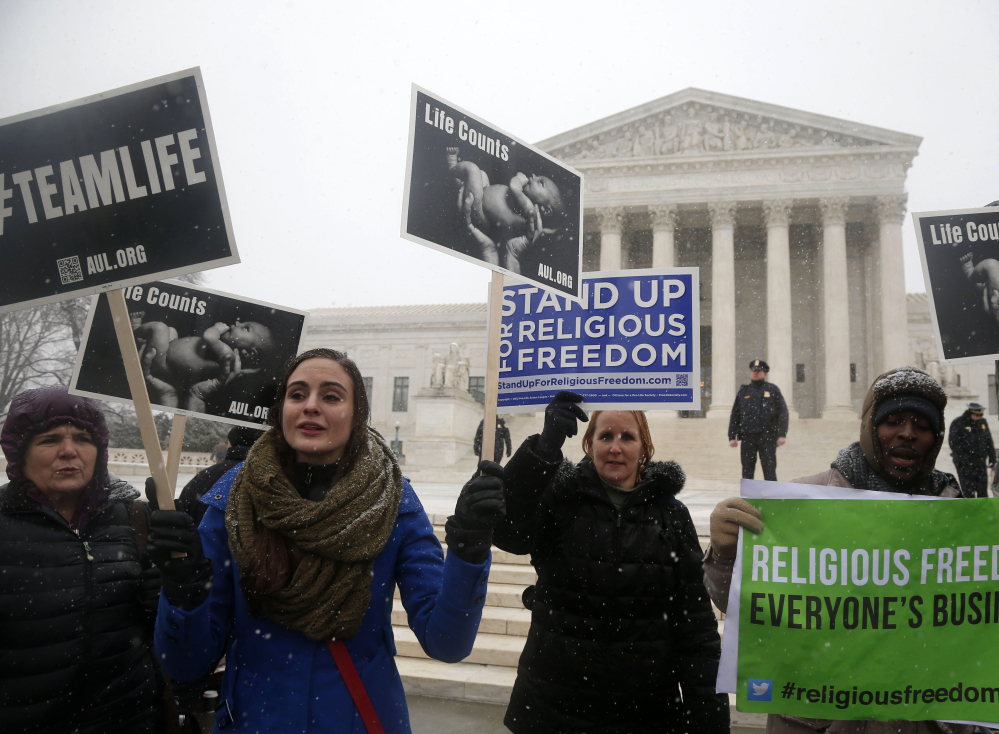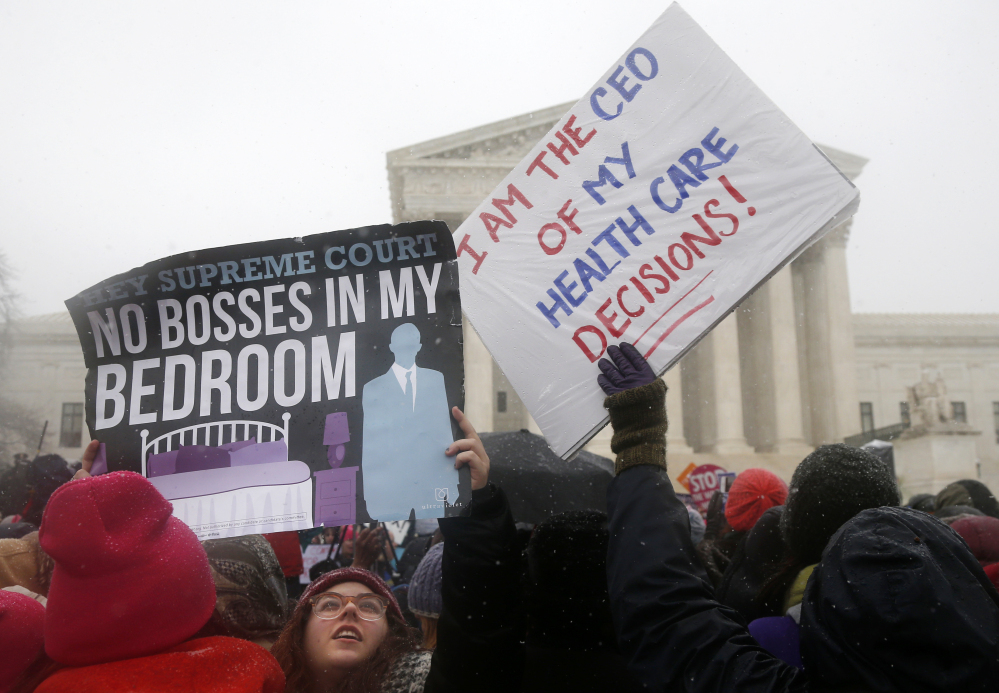A divided Supreme Court seemed inclined to agree Tuesday that the religious objections of business owners may protect them from a requirement in President Barack Obama’s Affordable Care Act that health insurance plans cover all types of contraceptives.
With both spring snow and demonstrators gathering on the sidewalk outside, the justices spent a spirited 90 minutes debating religious conviction, equal treatment for female workers and whether the court would be opening the door for religious challenges to all sorts of government regulation.
It is difficult to predict a precise outcome based on the justices’ wide-ranging questions and statements. But a majority did seem to come together on the threshold question of whether a corporation can even hold religious views.
The conservative wing of the court seemed to agree that the challengers in the two cases – closely held corporations owned by families whose religious beliefs the government does not question – could be covered by a federal law that provides great protection for the exercise of religion.
KENNEDY HOLDS THE KEY?
For the contraceptive requirement to apply to the companies, the government would have to show that it has a compelling interest in enforcing the requirement, that this does not impose a substantial burden on religious exercise, and that there was no less-intrusive way to provide coverage to female workers.
As is often the case, Justice Anthony Kennedy – who voted two years ago to find Obama’s health-care law unconstitutional – seemed to hold the deciding vote.
Some of his remarks and questions favored the government. He was concerned, for instance, about workers being denied coverage to which they were entitled by law because of their employers’ objections.
But Kennedy may have signaled a deeper concern when he raised the worry that the government’s reasoning would mean there was little that employers could object to funding. Kennedy told Solicitor General Donald Verrilli Jr. that under Verrilli’s view, a corporation “could be forced in principle to pay for abortions.”
Verrilli said there are laws against that.
“But your reasoning would permit that,” Kennedy responded.
Verrilli wanted to talk more about Kennedy’s other point and tried to get the justices to focus on the rights of the employees, who would be denied the best type of contraceptive coverage for them.
The three liberal and female justices were skeptical and aggressive questioners of Paul Clement, the Washington lawyer representing two companies that object to providing coverage for emergency contraception and intrauterine devices (IUDs).
Justices Sonia Sotomayor and Elena Kagan continually pressed Clement on whether his argument could be extended to employers that decline to pay for blood transfusions or vaccines because of religious objections.
“The entire U.S. code” as it applies to corporations would have to be held to the highest constitutional scrutiny, Kagan said.
“So another employer comes in, and that employer says, ‘I have a religious objection to sex discrimination laws.’ And then another employer comes in, ‘I have a religious objection to minimum wage laws.’ And then another, family leave. And then another, child labor laws,” Kagan said.
Clement said that there is no reason to believe that would happen, and that courts could decide whether such claims had merit.
The arguments by Verrilli and Clement were something of a rematch – the two were the lawyers when the court in 2012 upheld the constitutionality of the Affordable Care Act on a 5 to 4 vote. They also were a reminder of the continuing controversy over Obama’s signature domestic program.
COMPANIES’ OBJECTIONS
Hobby Lobby, an arts and crafts chain, and Conestoga Wood Specialties, a Pennsylvania cabinet-making company say they are comfortable offering insurance plans that cover most types of contraceptives, but not ones that they say could endanger a fertilized egg, because they believe life begins at conception.
Conestoga objects to offering the emergency contraceptives Plan B and Ella. Hobby Lobby adds IUDs to that list.
Clement faced a barrage of questions. He had barely begun speaking when Sotomayor asked about blood transfusions and vaccinations.
Kagan said, “You would see religious objectors come out of the woodwork” if the court agreed with Clement. “So one religious group could opt out of this and another religious group could opt out of that and everything would be piecemeal and nothing would be uniform,” she said.
Clement disputed the assertions. “I do think this case is, in a sense, easier than most of the examples that you’ve brought up because here’s one where it’s so religiously sensitive, so fraught with religious controversy, that the [government] itself provides a certain number of exemptions and accommodations,” he said.
Kennedy seemed interested in a point the liberal justices raised: that the companies could pay a $2,000 tax per employee and not offer health insurance at all. Clement said that would put the companies at an economic disadvantage and require them to pay higher wages so the workers could buy their own insurance.
Verrilli got a similar grilling from conservatives. Chief Justice John Roberts Jr. and Justice Samuel Alito Jr. noted that the government had made many exceptions to the contraception requirement: for employees of churches, those who work for companies whose plans were “grandfathered in” and for religiously affiliated nonprofit corporations.
More troublesome for the government was Kennedy’s remark about abortion.
“Isn’t that what we are talking about in terms of their religious beliefs?” Roberts asked. “One of the religious beliefs is that they have to pay for these four methods of contraception that they believe provide abortions.”
Verrilli said that the business owners are entitled to their opinions but that neither federal nor state laws recognize the disputed contraceptives as inducing abortion.
“With all due respect, I would say that I think that, you know, we’ve got about 2 million women who rely on the IUD as a method of birth control in this country,” Verrilli said. “I don’t think they think they are engaged in abortion in doing that.”
The court will render a decision during its current term, which ends in late June.
Send questions/comments to the editors.




Success. Please wait for the page to reload. If the page does not reload within 5 seconds, please refresh the page.
Enter your email and password to access comments.
Hi, to comment on stories you must . This profile is in addition to your subscription and website login.
Already have a commenting profile? .
Invalid username/password.
Please check your email to confirm and complete your registration.
Only subscribers are eligible to post comments. Please subscribe or login first for digital access. Here’s why.
Use the form below to reset your password. When you've submitted your account email, we will send an email with a reset code.